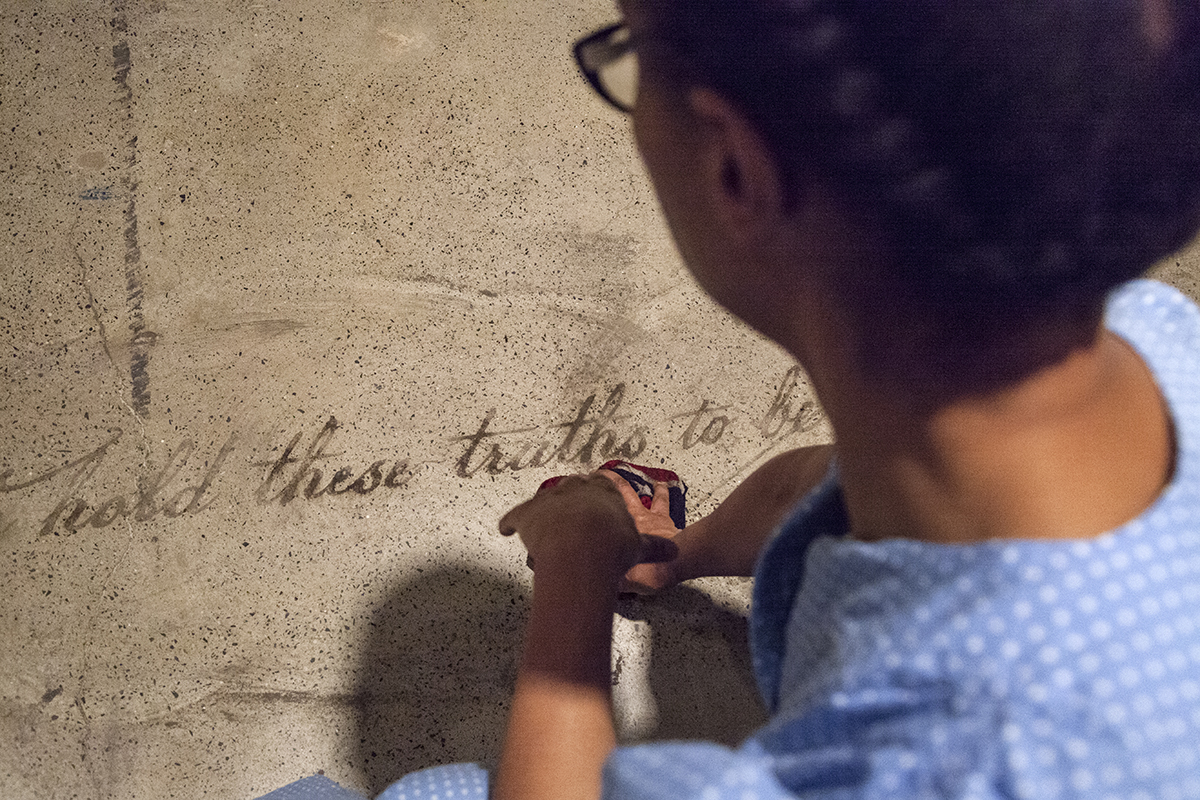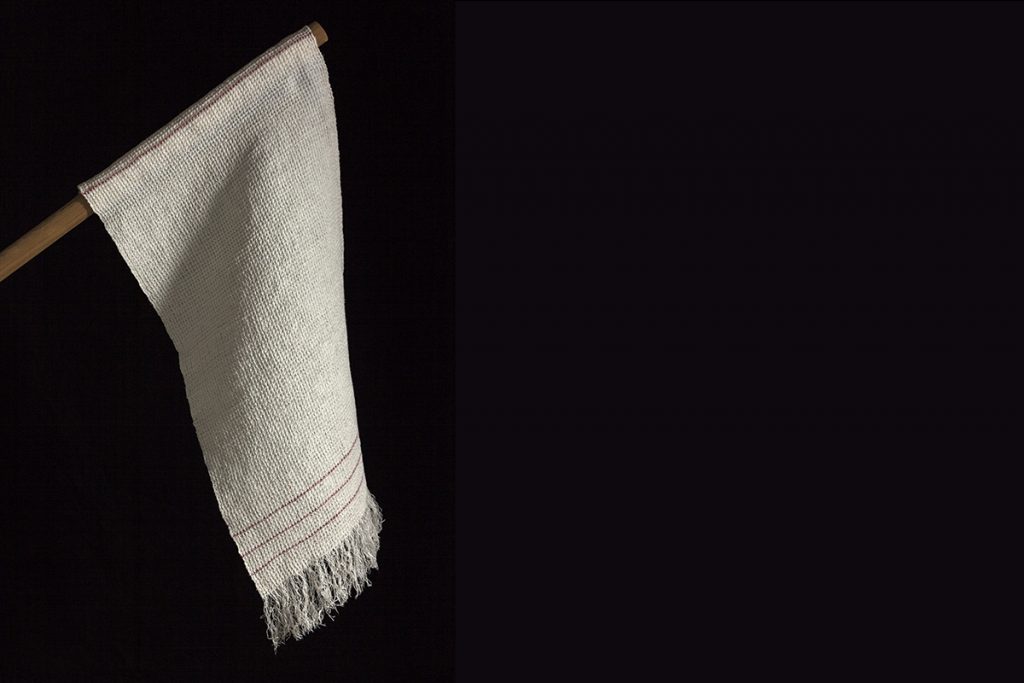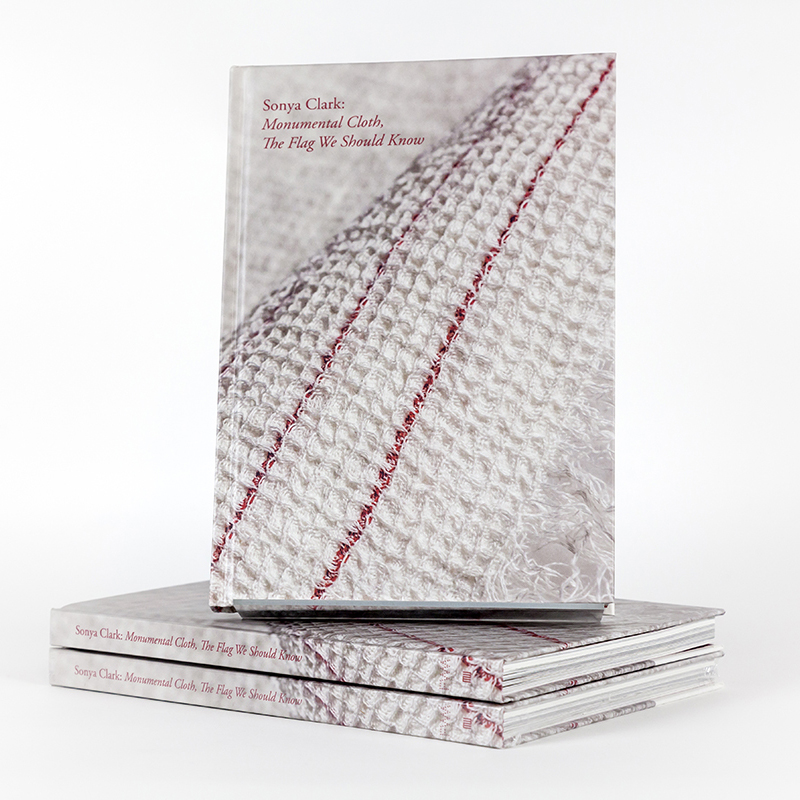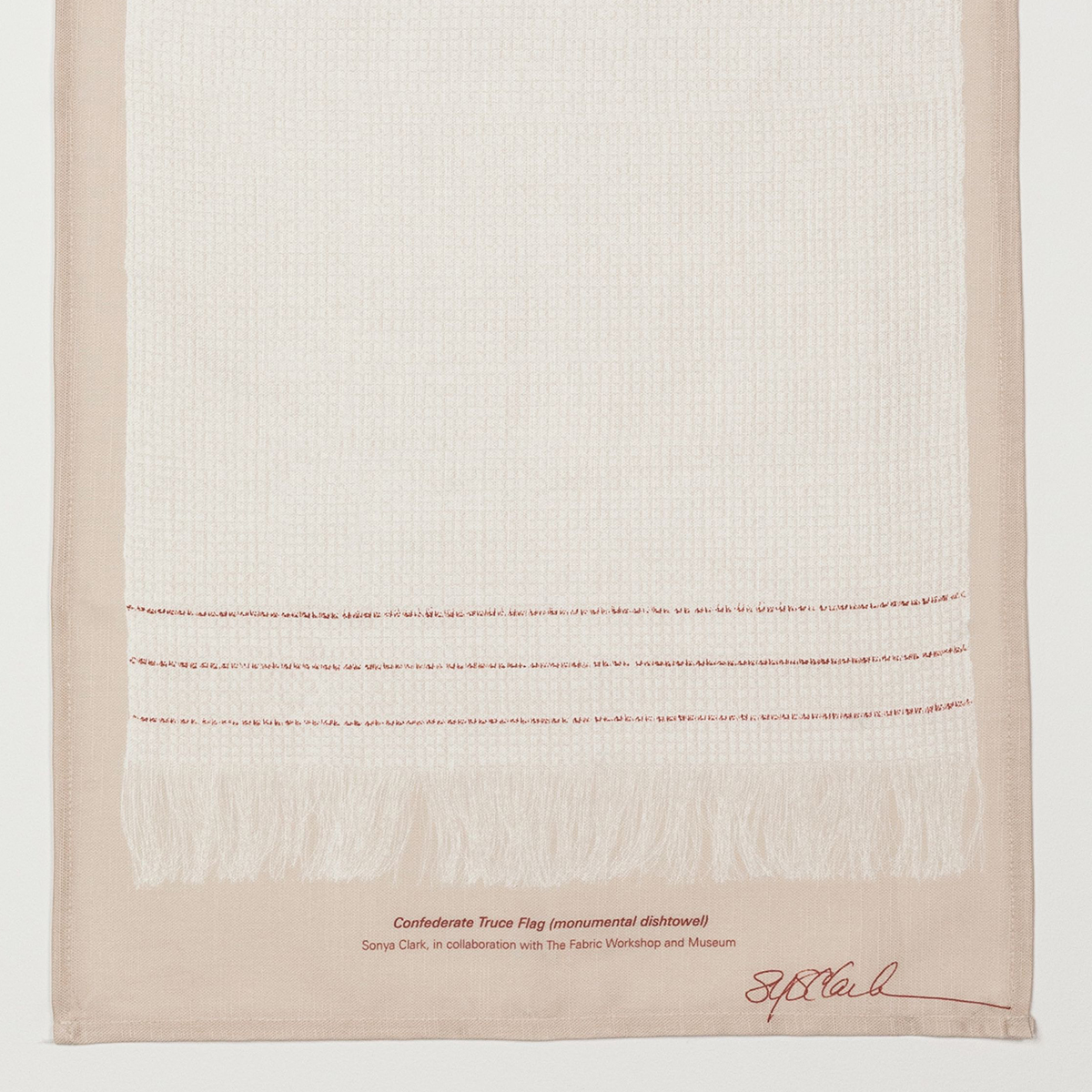Artist Sonya Clark draws on everyday materials to investigate how our assignment of meaning to objects reflects our personal and collective attitudes. For decades, Clark has sustained her line of inquiry into the black experience in the United States, often using cultural symbols in her work to grapple with the relationships between history, social justice, institutional racism, and racial inequality. Past works have integrated a wide range of objects, including combs, copper pennies, beads, kente cloth and hair, which “absorb our stories and reflect our humanity back to us.” Decades prior to her tenure as Artist-in-Residence, Clark began her work in the FWM studios as part of the museum’s Apprenticeship Training Program in 1993. Monumental Cloth, The Flag We Should Know marked a full circle moment—and a serendipitous partnership—for Sonya Clark and The Fabric Workshop and Museum, a former flag factory particularly well-suited for the artist’s work with the Confederate Flag of Truce.
Previously, Clark utilized the Truce Flag—a little-known dishcloth that marked the end of the American Civil War in 1865—metaphorically as a tool for resolution driven by efforts to replace contentious images such as the Confederate Battle Flag. In her 2017 piece, Monumental Cloth (sutured), the artist reproduced the Truce Flag with the intention of drawing attention back to the flag that brokered peace. In doing so, she questioned why symbols of hate and white supremacy, such as the well-known Battle Flag, have been memorialized over symbols of peace. As an Artist-in-Residence, Sonya Clark sought to continue exploring the legacy of these symbols, collaborating with the FWM Studio team to reimagine the scale and presentation of the Truce Flag in an epic way.
Clark’s residency with The Fabric Workshop and Museum culminated in the presentation of her 2019 exhibition, Monumental Cloth, The Flag We Should Know. Two core installations of the exhibition—Monumental and Many—featured distinct but complementary recreations of the Confederate Truce Flag. With Monumental, the 15 x 30-foot recreation measured ten times its original size with a display reminiscent of the Star Spangled Banner, the celebrated American flag on display at the National Museum of American History. Panels for the large-scale replica were woven at Family Heirloom Weavers in upstate Pennsylvania, a textile mill specializing in the authentic reproduction of American textile, and later mended together onsite at FWM. The adjacent Many, consisting of 100 true-to-scale replicas woven with traditional methods, also featured cloths constructed using the waffle weave technique and accented by red stripes created with historically accurate madder root dye.
In preparation for the exhibition, Clark also led her inaugural Truce Workshop to initiate conversation amongst citizens, city officials, educators, and scholars about the history and cultural impact of the Confederate Battle Flag as well as the lesser-known Truce Flag. During opening weekend, the artist’s Reversals performance activated the second floor galleries: cleaning dust gathered from Independence Hall and the Declaration House off the gallery floor with a commercially-printed Confederate Battle Flag dishcloth, Clark revealed a winding passage of text from the Preamble to the Declaration of Independence. On the same floor, two participatory installations—Lesson Plan (Confederate Truce Flag) and Reconstruction Exercise—familiarized visitors with the Truce Flag’s form and texture through weaving and rubbing replicas.
Reconstructions of the Confederate Battle Flag in Clark’s 2015 and 2016 works such as Unraveling & Unraveled, Black and White Flag, and Interwoven revisited and challenged symbolic representations of American political history. Works created during the artist’s residency at FWM represent a shift in her studio practice, from dissecting divisive images such as the Confederate Battle Flag to amplifying lesser-known pieces of Americana with fewer connotative histories to amend past imbalances. The complexities of race and culture remain central to Clark’s practice while expanding to embrace historical ephemera previously omitted and ignored. Clark’s apprenticeship—and subsequently her residency—reinforce The Fabric Workshop and Museum’s mission of producing new ideas that build upon a base of previously founded concepts.
Learn More
Sonya Clark: Reversals
On March 30, 2019, artist Sonya Clark activated the second floor galleries at The Fabric Workshop and Museum with a symbolic reversal. For this one-time performance, the gallery floor was covered with dust gathered from historic sites (Independence Hall and Declaration House) in Philadelphia. Wearing a reproduction of the dress worn by cleaning woman Ella Watson in American Gothic—the iconic photograph by the late Gordon Parks—Clark used a Confederate Battle Flag dishtowel (commercially available and purchased from an online vendor) to clean the floor and in turn, reveal a passage of text from the Preamble to the Declaration of Independence. The revealed text remained on view for the duration of the exhibition, Monumental Cloth, The Flag We Should Know (March 29–August 4, 2019) at FWM.
Video excerpt from ‘Reversals,’ a performance by Sonya Clark at The Fabric Workshop and Museum on March 30, 2019. Videography by Brittany Rafalak and George Macleod. Edited by Carlos Avendaño. Courtesy of the artist and The Fabric Workshop and Museum.
Gallery Interview with FWM Artist-in-Residence Sonya Clark
Interview with Sonya Clark, filmed in The Fabric Workshop and Museum galleries in March 2019, discussing her residency and culminating exhibition, Monumental Cloth: The Flag We Should Know.
Interview by Erin Sweeny. Video and editing by Carlos Avendaño.
Sonya Clark: On Truce and the Everyday Work of Dismantling Systemic Racism
This video short is an excerpt from a March 2019 interview recorded in the FWM galleries.



